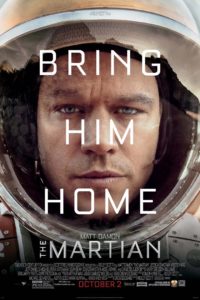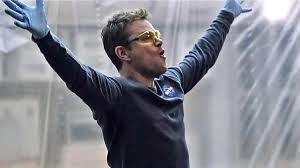 Who wants their debut novel be that quintessential novel lauded by readers, swooped up by Hollywood and flocked to be seen by millions? We all do. And if not the first, make it the sixth. It’d be amazing to have millions as enthusiastic about a project as we’ve been. So for that, I tip my invisible hat to Andy Weir and his novel turned movie The Martian.
Who wants their debut novel be that quintessential novel lauded by readers, swooped up by Hollywood and flocked to be seen by millions? We all do. And if not the first, make it the sixth. It’d be amazing to have millions as enthusiastic about a project as we’ve been. So for that, I tip my invisible hat to Andy Weir and his novel turned movie The Martian.
I enjoyed the novel even more than the movie only because I could immerse myself in the techno-babble. As a scientist, I am always wondering how things are made, how one would get out of a situation, what something means, how something be fixed. What made the technological realities of this story satisfying was that they were well researched and experts aren’t arguing over it. The TV series MacGyver was always one of my favorites because MacGuyver was a mild mannered secret agent who fought the bad guys by using the ordinary materials he found around him to make  unorthodox weapons. MacGuyver’s ingenuity always amazed me. Step in Mark Watney who must “…science the s— out of this” and he becomes my MacGuyer of the space age. How would you grow a potato on Mars or make water? The technology and ingenuity in this story tells tell us that our dreams of living somewhere else in space are possible.
unorthodox weapons. MacGuyver’s ingenuity always amazed me. Step in Mark Watney who must “…science the s— out of this” and he becomes my MacGuyer of the space age. How would you grow a potato on Mars or make water? The technology and ingenuity in this story tells tell us that our dreams of living somewhere else in space are possible.
The movie did something that the book could not – it visually put me on Mars and it felt like a virtual reality experience. The cinematography was superb, the musical scores weren’t greedy, and the pacing was quick (it was a short 142 minutes!). The Martian was suspenseful, smartass, well acted, and eye-rolling touches like the disco music the commander left behind accent Mark Watney’s interminable and almost intolerable situation superbly.
We always knew how the story would end – Mark would survive and his team would come back, somehow, to rescue him. But the question was always ‘How?’ How would Mark survive? How would he find the air he needed? What would he eat? Find water? How would he overcome the disaster of the storm, when his efforts to obtain the basic necessities resulted in disasters? How could he even communicate he was alive?
It wasn’t just these questions, or Mark Watney’s MacGuyver attitude that made this movie entertaining. It was the talented cast who didn’t overact, whose banter and disagreements felt real. Matt Damon’s character was a scientist with a wry attitude who came close to a breakdown at one point. I especially enjoyed Donald Glover’s portrayal of Rich Purnell, an eccentric, socially awkward scientist who doesn’t know his director’s name. Or, Jessica Chastain’s portrayal of Melissa Lewis, Commander of the Ares 3 Mission, and her crew who faced the tough decisions like leaving a man behind, mutiny to save him and ingenuity to make the rescue mission work.
Matt Damon did an excellent job on the man vs nature, man vs himself, the pioneer aspects of the movie. The rest of the cast tackled the man vs the-cost-be-damned-because-it’s-the-right-thing-to-do, man vs the corporation, tossed in with difficult science, small windows of opportunity, vast distances, and slow communication with Mars. As writers we know we must make things more and more difficult for our characters. It’s in overcoming obstacles that the character and readers experience cathartic moments in our stories. And this story has those difficulties in in every aspect of the story. The hero’s troubles escalate and as time passes and stuff happens, they become critical. His support systems, his ship mates and NASA, face the impossible and after we’re told that the science won’t work, a failure to launch happens, the possibility of rescue becomes minute and the chances of failure increase. It’s daunting as is the spirit of those involved.
 It’s where human spirit and ingenuity prevail where people not only do the right thing, but they do it despite the odds. Space may be the final frontier, but when go forth to make the dream a reality – we want to be Mark Watney – ingenious enough to survive despite the odds while our support systems do everything they can not to fail us. The Martian isn’t merely a movie about the first steps of colonizing Mars, it’s about hopes, the cost of dreams, survival at its most basic. It’s about the pioneering spirit and about us taking the first steps to know if we’re alone I the universe. It brings our beloved space operas closer to reality, makes science fiction feel a little more real.
It’s where human spirit and ingenuity prevail where people not only do the right thing, but they do it despite the odds. Space may be the final frontier, but when go forth to make the dream a reality – we want to be Mark Watney – ingenious enough to survive despite the odds while our support systems do everything they can not to fail us. The Martian isn’t merely a movie about the first steps of colonizing Mars, it’s about hopes, the cost of dreams, survival at its most basic. It’s about the pioneering spirit and about us taking the first steps to know if we’re alone I the universe. It brings our beloved space operas closer to reality, makes science fiction feel a little more real.
As a space opera fan and as someone who yearns to travel across the universe, The Martian fuels my love of space stories and makes the dream of space travel and colonization feel one step closer. And, as a writer, Andy Weir’s accomplishment reassures us that the dream of an outstanding debut novel is possible. I thank him for his vision and his execution of that vision and I thank him for a most entertaining story.
